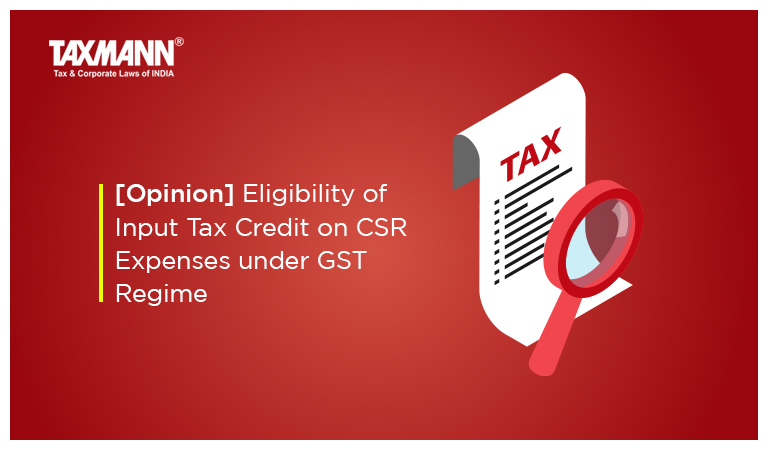[Opinion] Eligibility of Input Tax Credit on CSR Expenses under GST Regime
- Blog|News|GST & Customs|
- 3 Min Read
- By Taxmann
- |
- Last Updated on 29 September, 2022

S.S. Gupta, Vaibhav Shah & Archit Agarwal – [2022] 142 taxmann.com 517 (Article)
Companies incur CSR expenses as part of their responsibility towards the Society. CSR allows businesses large and small to enact positive change. The socially responsible company gets higher level of support from their community and consumers. Some of the most common examples of CSR include Community development, Education, Healthcare, Infrastructure development for the society etc.
Many of the expenses incurred for CSR initiatives attract Goods and Services Tax (‘GST’). The debate on eligibility of taxes paid on expenses incurred towards CSR is an old one, which goes back to pre-GST regime and continues in GST regime. Like in Pre-GST regime, the GST provisions as well do not specifically provide for Input Tax Credit (‘ITC’) eligibility or otherwise of GST paid on CSR related expenses.
There is lot of controversy in availment of input tax credit of GST paid on CSR Expenses. There are contrary judgements. This article analyses the statutory provisions and the basis for allowing the credit. The statutory provisions under GST and other Acts and judicial decision or ruling are discussed under this article.
Statutory Provisions
The Central Goods and Services Act, 2017 (‘GST Act’) permits credit of input tax paid on input, input services and capital goods. These are defined as follows:
-
- Section 2(19) – ‘Capital Goods’
(19) “capital goods” means goods, the value of which is capitalised in the books of account of the person claiming the input tax credit and which are used or intended to be used in the course or furtherance of business; - Section 2(59) – ‘Input’
(59) “input” means any goods other than capital goods used or intended to be used by a supplier in the course or furtherance of business; - Section 2(60) – ‘Input Services’
- Section 2(19) – ‘Capital Goods’
(60) “input service” means any service used or intended to be used by a supplier in the course or furtherance of business;
It will be observed from the above definition that the inputs, input services, capital goods should be used in the course or furtherance of business. The words ‘in the course or furtherance of business’ is not defined in the GST Act but Hon’ble Supreme Court has very widely interpreted the word ‘business’ under Income Tax Act. The observation of Supreme Court in few cases are:In CIT v. Chandulal Keshavlal & Co. [1960] 38 ITR 601 the Apex Court held as under:
The test laid down by this case therefore was that in the absence of fraud or an oblique motive and if a transaction is of a nature which is entered in the course of a business of the assessee and is commercially expedient that it does become a deductible allowance. If as a result of the transaction the assessee benefits is immaterial that a third party also benefits thereby. (Emphasis supplied)
Similarly, in Eastern Investments Ltd. v. CIT [1951] 20 ITR 1 the Hon’ble Apex Court held as under:
Most commercial transactions are entered into for the mutual benefit of both sides, or at any rate each side hopes to gain something for itself. The test for present purposes is not whether the other party benefited, nor indeed whether this was a prudent transaction which resulted in ultimate gain to the appellant, but whether it was properly entered into as a part of the appellants legitimate commercial undertakings in order to indirectly facilitate the carrying on of its business.
The observation under income tax will be applicable in GST also. Therefore, direct or indirect benefit to the business is essential to substantiate that input, input services or capital goods has been used in the course or furtherance of business.
Click Here To Read The Full Article
Disclaimer: The content/information published on the website is only for general information of the user and shall not be construed as legal advice. While the Taxmann has exercised reasonable efforts to ensure the veracity of information/content published, Taxmann shall be under no liability in any manner whatsoever for incorrect information, if any.

Taxmann Publications has a dedicated in-house Research & Editorial Team. This team consists of a team of Chartered Accountants, Company Secretaries, and Lawyers. This team works under the guidance and supervision of editor-in-chief Mr Rakesh Bhargava.
The Research and Editorial Team is responsible for developing reliable and accurate content for the readers. The team follows the six-sigma approach to achieve the benchmark of zero error in its publications and research platforms. The team ensures that the following publication guidelines are thoroughly followed while developing the content:
- The statutory material is obtained only from the authorized and reliable sources
- All the latest developments in the judicial and legislative fields are covered
- Prepare the analytical write-ups on current, controversial, and important issues to help the readers to understand the concept and its implications
- Every content published by Taxmann is complete, accurate and lucid
- All evidence-based statements are supported with proper reference to Section, Circular No., Notification No. or citations
- The golden rules of grammar, style and consistency are thoroughly followed
- Font and size that’s easy to read and remain consistent across all imprint and digital publications are applied



 CA | CS | CMA
CA | CS | CMA
